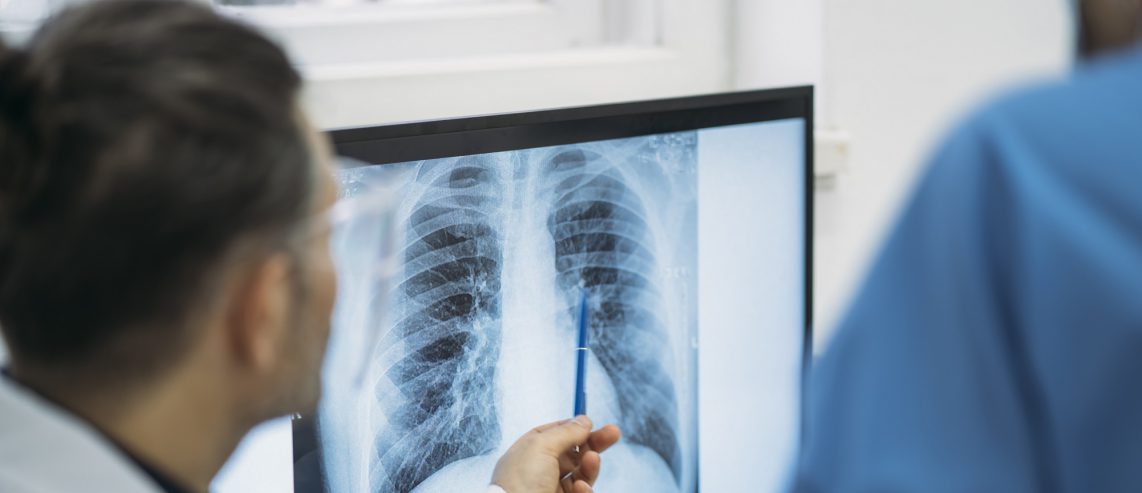Lung cancer is the leading cause of cancer death in the United States. But early detection can improve outcomes and save lives.
Ryan Levy, MD, is division chief at UPMC’s Division of Thoracic Surgery. Here, he discusses treatment options, early warning signs, and what you need to know about lung cancer screening.
Q: What are the causes of lung cancer?
A: Most lung cancer cases are caused by smoking. At UPMC, about 80% of our patients with lung cancer have a smoking history. The other 20% of our patients have no smoking history.
Potential risk factors for these non-smoking cases include:
- Family history of lung cancer.
- Secondhand smoke exposure.
- Environmental pollutants.
- Exposure to chemicals, such as radon gas and asbestos.
Q: Are there different types of lung cancer?
A: Yes, there are different types of lung cancer. The most common form of lung cancer is non-small cell lung cancer, which accounts for about 85% of all lung cancer cases.
A smaller percentage of lung cancer cases are small cell lung cancer, accounting for about 15% of all lung cancers. Small cell lung cancer is an aggressive cancer that is often centrally located in the lungs or chest and is typically managed without surgery.
The rarest form of lung cancer is carcinoid tumors, which comprise 1% to 2% of all lung cancers. These tumors arise from neuroendocrine cells in the lungs and are best treated surgically.
Q: What are the symptoms of lung cancer?
The most common symptoms of lung cancer are:
- Cough.
- Coughing up bloody or rust-colored mucus.
- Shortness of breath.
- Chest pain.
- Wheezing.
- Unexplained weight loss.
Q: What’s the importance of early detection and screening for lung cancer?
A: Early detection is vital for lung cancer. Most early-stage cases are either asymptomatic or minimally symptomatic. Our best chance of cure is when the disease is detected at stage 1. If you wait until symptoms develop, the disease is often advanced, making a cure less likely.
The American Cancer Society has lung cancer screening guidelines. Screenings are recommended for anyone over age 50 who has smoked for 20 years. To be eligible for screening, you can be a current smoker or a former smoker who has quit within the past 15 years.
Q: What are the treatment options for lung cancer?
A: The goal of screening is diagnosing lung cancer early. For early-stage patients with lung cancer that is localized within the chest, surgical treatment is typically recommended.
For more advanced stages of lung cancer, such as tumors that have spread to the lymph nodes or other organs, such as the bones, liver, or brain, patients may need a nonsurgical method of treatment.
At UPMC, we are committed to creating personalized treatment plans tailored to each patient’s specific needs.
Q: What are the surgical options for treating lung cancer?
A: When detected early at stage 1 or 2, the standard of care for lung cancer treatment is surgery. Our thoracic surgeons at UPMC have expertise in both minimally invasive and traditional open-surgical approaches for treating lung cancer.
At UPMC, we routinely perform minimally invasive surgery using innovative technology, including video-assisted and robotic-assisted thoracic surgery (VATS/RATS).
Never Miss a Beat!
Subscribe to Our HealthBeat Newsletter!
Thank you for subscribing!
You can now select the specific newsletters you'd like to receive.
You are already subscribed.
Subscribe to more newsletters in our email preference center.
Sorry, an error occurred. Please try again later.
Get Healthy Tips Sent to Your Phone!
Comprehensive Lung Care at UPMC
The UPMC Division of Thoracic Surgery is a nationally recognized leader in treating diseases of the lungs. To learn more about lung surgery at UPMC or to make an appointment, visit our website or call 412-647-5864.
About UPMC Hillman Cancer Center
When you are facing cancer, you need the best care possible. UPMC Hillman Cancer Center provides world-class cancer care, from diagnosis to treatment, to help you in your cancer battle. We are the only comprehensive cancer center in our region, as designated by the National Cancer Institute. We have more than 70 locations throughout Pennsylvania, Ohio, and New York, with more than 200 oncologists – making it easier for you to find world-class care close to home. Our internationally renowned research team is striving to find new advances in prevention, detection, and treatment. Most of all, we are here for you. Our patient-first approach aims to provide you and your loved ones the care and support you need. To find a provider near you, visit our website.

